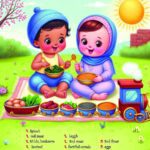Finding the right feeding schedule for a 12-months-old breastfed baby is crucial for ensuring they receive the nutrients needed for optimal growth and development. As babies reach their first birthday, their nutritional needs evolve, requiring a balanced mix of breast milk and solid foods. This guide aims to provide parents and caregivers with detailed insights into creating an effective feeding plan that supports their child’s development.
Understanding the Nutritional Needs of a 12-Month-Old
By the time babies hit 12 months, they are usually ready to explore a wide variety of textures and flavors in solid foods, alongside breast milk which remains a valuable source of nutrition. It’s a time of significant growth and development, making it essential to ensure their diet supports their nutritional needs. According to the World Health Organization, continued breastfeeding up to 2 years or beyond provides babies with the necessary nutrients, protection from infections, and fosters a special bond between mother and child.
Integrating solid foods while continuing breastfeeding can be a delicate balance. It’s important to introduce a variety of foods to ensure they receive a broad spectrum of vitamins, minerals, and other nutrients essential for development. This is where understanding and implementing a suitable feeding schedule for a 12-months-old breastfed baby comes into play, facilitating smooth transitions and adequate nutrition.
Feeding Schedule for 12-Months-Old Breastfed Baby
Creating a feeding schedule for a 12-months-old breastfed baby involves a mix of regular breast milk feedings and the introduction of solid foods. Typically, a 12-month-old baby may breastfeed about 3 to 4 times per day. These sessions complement the solid meals and snacks, ensuring they continue to receive the benefits of breast milk, such as antibodies and essential fatty acids that support brain development.
Meal times should focus on introducing a wide variety of solid foods, including fruits, vegetables, grains, and proteins, to encourage healthy eating habits. It’s also the perfect time to start incorporating more finger foods to help develop their fine motor skills. The transition to family meals can begin, allowing your baby to try small, manageable portions of the same food the rest of the family is eating, with adjustments for salt and sugar content. For detailed guidance on introducing solids, consider visiting How to Introduce Solid Foods to a 6-Month-Old Baby with Allergies.
Navigating Challenges in Feeding a 12-Month-Old
While establishing a feeding schedule for a 12-months-old breastfed baby, you may encounter challenges such as picky eating or fluctuating appetite. It’s crucial to remain patient and persistent, offering a variety of foods without pressure. For strategies on dealing with picky eaters, refer to Dealing with Picky Eaters: Strategies for 1-Year-Olds.
Moreover, as breastfeeding frequency decreases, monitoring hydration becomes important. Ensure your child consumes adequate fluids, primarily water, throughout the day. If concerns about hydration or nutritional intake arise, it’s advisable to consult with a pediatric healthcare provider for personalized advice.
Tips for Successful Breastfeeding and Solid Food Integration
To make the transition from exclusive breastfeeding to including solid foods in your baby’s diet smoother, here are some tips:
- Continue breastfeeding on demand, adjusting as needed for your baby’s hunger cues.
- Introduce solid foods gradually, starting with small amounts once or twice a day and increasing as your baby shows interest and tolerance.
- Focus on iron-rich foods to complement breast milk’s nutritional profile, especially as your baby’s iron stores start to deplete around 6 months. For tips on iron-rich foods, visit Top Iron-Rich Foods for Babies Starting on Solids.
- Encourage self-feeding with safe, baby-sized utensils and finger foods to promote independence and motor skills development.
- Be mindful of your baby’s cues for fullness and hunger, and avoid forcing meals if they are not interested.
- Consult with healthcare professionals to tailor the feeding schedule and dietary choices to your baby’s specific health needs and developmental stages.
By following these guidelines and maintaining flexibility in your approach, you can create a nurturing environment that supports your 12-month-old’s growth and development through a balanced diet of breast milk and solid foods. Remember, every baby is unique, and their feeding needs will evolve. Stay attuned to their signals, and adjust their feeding schedule for a 12-months-old breastfed baby as necessary to ensure they thrive.
For more resources on breastfeeding and baby nutrition, explore our library of articles, including Vegan Baby Nutrition Plan for the First Year and Introducing Solid Foods to Babies with a Family History of Allergies.













